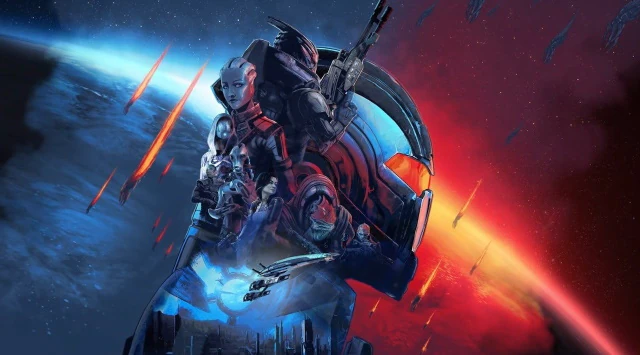Harsh PareekJun 15, 2021 11:45:27 IST
In BioWare’s Mass Effect, you play an alpha solider, well-known in military circles across the galaxy for “what you did in _____” [(you get to) fill in the blank with some vague heroic undertaking]. Beyond that, the accolades involve being the person with the lowest stamina in the world and someone who never quite got around to figuring out the concept of jumping.
Now, not the only fate of billions of lives rests on your shoulders, but you also gotta show them no-good alien species why humans are the undisputed No 1 anywhere and everywhere, forever and ever. Nobody puts baby in the corner.
Starting out with the franchise today, some 14 years after the release of the first game, can be a bit of a jarring experience. While certainly a polished and optimised, the age shows in almost every aspect of the game. Does that mean one should navigate to avoid the pull of this franchise in 2021? Let’s find out.
The remastered trilogy (yeah, we don’t talk about you-know-which-one), released last month, seemed to be targeted primarily at the fans of old, as a chance to re-live the experience on the new generation of machines, with better graphics/gameplay. And fans of the series, there are many. But the Legendary Edition (as the re-release is called), also offers a chance to players unfamiliar with the franchise (believe it or not, they do exist) to jump into the shoes of the protagonist, the above-mentioned elite and entirely clueless human soldier Commander Shepard, for some space exploration and alien butt-kicking.
Considered by some to be one of the greatest of all time, the influential action role-playing video game today comes, like few others of similar stature, with a disclaimer: You’d better like it.
And there is indeed much to like, and love. But all that glitters is certainly not gold here. For first-timers like yours truly, while it throws in some unexpectedly delightful surprises, it does come across like a game that perhaps hasn’t aged all too gracefully.
Before we get further, a side note: Just so we’re on the same page, the game being discussed here is the first in the series, simply called, Mass Effect; and not the entire Mass Effect trilogy.
It would do well to bear in mind that the game is a remaster, and not a remake. So while the graphics are upgraded and some mechanics improved upon, the core gameplay remains the same. For example, the combat, which is a big part of the game, is as basic as it gets. Take cover, point and shoot. (When in crouched cover, moving sideways remains a sight to behold.) You do get to choose two squad mates (from a roster of six) to assist you during each mission (more on them in a bit), but there is little depth to it. Meanwhile, the Mako, a somewhat futuristic-looking tank-like vehicle in which you spend way too much time, drives like a broken supermarket trolley on an oil spill.
But what about the story, the storytelling, the characters and all that good stuff?
Well, here is where things get interesting.
Spanning a galaxy, the scope of the tale told is vast; but like much else in the game, it revolves around conflict and acts of violence. Fighting is more often than not the ultimate, approaching virtuous, means to a goal. While it is a reasonable argument that in the game’s universe, the aggression of the enemy needs to be met with equal force, whenever it does come up, diplomacy is almost looked down upon, something to trick oneself out of. Although fantastical in its plot and world, the game is plain in its imitation of life, whether it’s the portrayal of racism, the tussle for power among classes or the forever wars. One wonders then if the core story could have been elevated with a bit more ambition and tact.
Like the combat, how the said story is told also feels outdated by today’s standards. While on one hand you start off playing with a character of considerable renown, having seen and done far more than any of your average Joe; at the same time you seem to have no knowledge of even the most basic things and happenings in the world around you. Living under a rock would be a grave understatement. Subsequently, the way exposition works here is by means of you bluntly asking other characters questions on par with if water is wet. The resulting effect is humorous at best, bewildering more often. (Tip: Going through the codex a couple of times makes the whole experience much better.)
But where the game excels, even by today’s standards, is the fabulous voice acting, carried by an incredible cast. It’s difficult to stress upon how much the voices lend weight to bringing the various characters to life. Apart from the numerous personalities you run into across the galaxy, you are surrounded by a core team of seven (six squad mates and the pilot of your spaceship, the Normandy), each with a reasonably rounded backstory (although many of them just happen to latch on to you — more or less swearing their lives and alliances — within moments of meeting you for the first time, so there’s that). After each mission, you can interact with the said characters who confide in you more and more as the game progresses, providing much grounding to your expansive, action-oriented space opera. Weirdly enough, while the voice acting is aces, the overall sound mixing is somewhat all over the place. At times a character will be barely audible (looking at you, Kaiden Alenko), while certain instances trigger speaker-splitting sounds (the ear-splitting Mass Relays were only fixed in the latest patch).
As mentioned earlier, there are times when the story does leave you in awe. But it’s not the big set pieces or action sequences (some of which are pretty absorbing as well), rather what the game leaves to your imagination. Moments like when one of your squad mates, Tali’Zorah, describes her home, the Flotilla (or the Migrant Fleet), a massive collection of starships that became home to her species and how life is like there. Or when Ashley Williams (another of your squad mates) talks about her family, giving a glimpse onto her life and childhood. Or when the leader of a small settlement on Feros, a planet of ancient crumbling skyscrapers, talks about finding tranquillity amid the ruins, making you see the surrounding in a new light. That the mission ends in a rather (un)expected manner isn’t the point here.
These are the moments that make you take a step back and truly appreciate the world-building and story potential of the game. And stay with you long after you’re done ticking-off your mission objectives and overcoming dramatic odds.
By the time you finish the game, it is hard not to argue that beyond its janky mechanics and at times questionable themes, Mass Effect has a heart. Although I believe that arguments on the lines of whether the game would have been such a success if it was released today to be rather futile, it does merit to ask if the game is worth diving into for the first time in 2021.
In pure technical terms, no one would be surprised to know that the game does not match up to the contemporary standards. Gaming as a whole has grown leaps and bounds in the last decade and half since Shepard became a household name in the community. Playing Mass Effect today on the back of any current AAA games is almost a sensory shock. But the simplicity of the mechanics also help make it more navigable if you’re in just for the story, and would like to move on to the next offering of the franchise.
So, while the remaster does not quite live up to the years of hype behind the game, it does manage to offer a glimpse into what the best version of this world could be. And perhaps most importantly, it lets the mind wander into the possibilities of what stories and secrets may lie across corners of the galaxy, beyond conflict.
Game played on PlayStation 4 Pro. Review code provided by publisher.










